Walker Percy, The Moviegoer. Percy’s first novel, published in 1961, is a startlingly rich and unsettling portrait of anomie under the aspect of modernity, seen through the eyes of a young man from New Orleans who flees from his fear of the meaninglessness of life by going to the movies and chasing his secretaries. Alienation is to American literature what love is to Italian opera, but The Moviegoer makes something enduringly new and relevant out of the old, old story (TT).
Archives for January 2009
TT: Coast to coast to coast (V)
 JANUARY 19 Off to San Francisco to see John Guare’s Rich and Famous at the American Conservatory Theater. It’s both convenient and reassuring to stay in familiar places when you travel as much as I do, so I booked myself into the Hotel Diva, which is across the street from A.C.T. The Diva is a bit boutiquey, to put it mildly, but the staff is friendly, the décor amusing, and the location unbeatable, at least if you’re a professional playgoer.
JANUARY 19 Off to San Francisco to see John Guare’s Rich and Famous at the American Conservatory Theater. It’s both convenient and reassuring to stay in familiar places when you travel as much as I do, so I booked myself into the Hotel Diva, which is across the street from A.C.T. The Diva is a bit boutiquey, to put it mildly, but the staff is friendly, the décor amusing, and the location unbeatable, at least if you’re a professional playgoer.
JANUARY 20 I watched the inauguration of President Obama in a diner up the street, then knocked out a posting about it that pulled in a bushel of hits. Lunch with Carey Perloff, A.C.T.’s artistic director, after which I spent the afternoon writing about Flannery O’Connor for Commentary. In the evening I went to Rich and Famous with Heather Heise, whom I hadn’t seen for nearly a year.
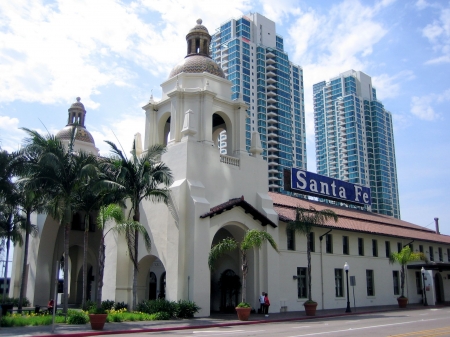 JANUARY 21 I flew to San Diego, picked up a rental car, drove to the train station, and met Mrs. T, who’d been spending a few days in Los Angeles with a mutual friend. We proceeded directly to Park Manor Suites, our regular San Diego residence, which is as dowdy and comfy as the Diva is cheerfully chic. After unpacking, unwinding, and catching up, we drove to the Old Globe Theatre to see Six Degrees of Separation, which was terrific, then returned to the hotel, whose restaurant is exceptionally good, for a late supper.
JANUARY 21 I flew to San Diego, picked up a rental car, drove to the train station, and met Mrs. T, who’d been spending a few days in Los Angeles with a mutual friend. We proceeded directly to Park Manor Suites, our regular San Diego residence, which is as dowdy and comfy as the Diva is cheerfully chic. After unpacking, unwinding, and catching up, we drove to the Old Globe Theatre to see Six Degrees of Separation, which was terrific, then returned to the hotel, whose restaurant is exceptionally good, for a late supper.
JANUARY 22 My body still thinks it’s in New York, so I woke up at four-thirty sharp. A good thing, too, since I had to write and file my Wall Street Journal drama column by nine a.m. local time. Once it was done, I tiptoed out and ate breakfast in the hotel’s rooftop café, then returned to the room and went back to bed.
 Mrs. T and I spent the afternoon driving around town. We went as far north as La Jolla, lunched on fish tacos, then made our slow way back down the coast, looking for possible places to stay next winter. (We like San Diego, which is companionable and pleasingly devoid of cutting edges.) Dinner at Café Coyote, which the hotel clerk recommended to us. “I’m Mexican, so I’m fussy about Mexican food,” he said. “This place is good.” It turned out to be the same place where we’d eaten last July, so we congratulated ourselves on having previously sniffed it out on our own.
Mrs. T and I spent the afternoon driving around town. We went as far north as La Jolla, lunched on fish tacos, then made our slow way back down the coast, looking for possible places to stay next winter. (We like San Diego, which is companionable and pleasingly devoid of cutting edges.) Dinner at Café Coyote, which the hotel clerk recommended to us. “I’m Mexican, so I’m fussy about Mexican food,” he said. “This place is good.” It turned out to be the same place where we’d eaten last July, so we congratulated ourselves on having previously sniffed it out on our own.
JANUARY 23 To Kansas City, leaving Mrs. T behind in San Diego, where it’s fifty degrees warmer. I left the hotel at six-thirty in the morning and landed at Kansas City International Airport nine hours later, having spent the middle part of the day in a Minneapolis departure lounge. It started snowing as soon as I picked up the rental car.
(To be continued)
TT: Twenty-five random things about me
Having been tagged by Gwen Orel and Lee Ann Westover in the past two days, I decided to play this game in public. So here goes:
1. I love corned-beef hash.
2. I played Beverly Carlton in a college production of The Man Who Came to Dinner.
3. Checking into a hotel makes me feel like a grownup.
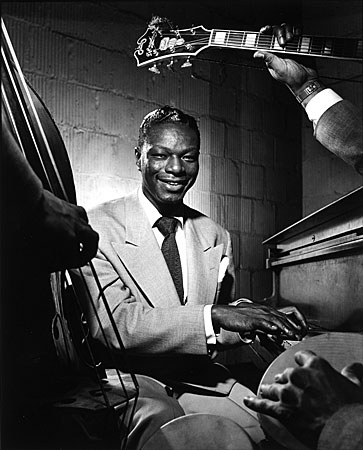 4. I don’t play piano much anymore, but I can still toss off the first chorus of Nat Cole’s “Easy Listening Blues” from memory. (In college my classical cheval de bataille was Brahms’ A Major Intermezzo, Op. 118/2.)
4. I don’t play piano much anymore, but I can still toss off the first chorus of Nat Cole’s “Easy Listening Blues” from memory. (In college my classical cheval de bataille was Brahms’ A Major Intermezzo, Op. 118/2.)
5. I can’t dance. Don’t ask me.
6. I wrote a play once. Alas, it wasn’t any good, a judgment that was confirmed by a well-known director to whom I showed it. This was before I became a drama critic–and yes, I’ve given the director in question plenty of favorable reviews since then. I’m nothing if not fair.
7. The thing I dislike most about myself is my chronic impatience. I try to keep it under control, but sometimes it slips out.
8. My favorite Broadway musical–not my pick for Best Musical Ever, but my personal favorite–is On the Town.
9. I don’t hold grudges.
10. All but two of my closest friends (including my best friend) are women.
11. I’m shy. My apparent gregariousness is an overcompensation…
12. …which is why cocktail parties make me acutely uncomfortable.
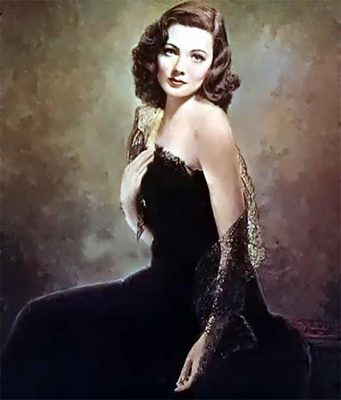 13. I think Gene Tierney was the most beautiful of all movie stars–but I’d have rather known Ida Lupino.
13. I think Gene Tierney was the most beautiful of all movie stars–but I’d have rather known Ida Lupino.
14. I prefer cold pizza. (This drives Mrs. T crazy.)
15. I almost never read poetry for pleasure, even though I’m always glad when I do.
16. It’s been a year since I last saw a movie in a theater.
17. I wish I had a deeper voice.
18. The last book I read was Walker Percy’s The Moviegoer (which I reread every year or so).
19. I played bass on two albums, both of which are out of print and neither of which I own.
 20. Given unlimited funds, the first thing I’d buy (other than a Frank Lloyd Wright house, which wouldn’t be very practical) is a Cézanne watercolor.
20. Given unlimited funds, the first thing I’d buy (other than a Frank Lloyd Wright house, which wouldn’t be very practical) is a Cézanne watercolor.
21. I’ve seen Falstaff more times than any other opera.
22. I have a weakness for funny women with cat-like faces.
23. My all-time favorite rock album is The Band. Runners-up: Steely Dan’s Aja, The Who Live at Leeds, and Erin McKeown’s We Will Become Like Birds.
24. I look frightful in a caftan.
25. I cry easily.
TT: Almanac
“By 1938, I had read so many books that I wrote one.”
Delmore Schwartz, The Ego Is Always at the Wheel: Bagatelles (courtesy of Paul Moravec)
TT: Where are they now?
I’m curious about the current whereabouts of two people whom I knew in college three decades ago, a violinist named Laura Gutsch and an oboe player named Michelle Rock. Both lived in the Kansas City area. Laura married and moved away, but I know nothing more about Michelle, who may or may not still be in Kansas City.
If anyone out there knows either of these women, would you be so kind as to send them a link to this posting?
TT: Looking for trouble
Brooke Campbell asked me at lunch the other day how I managed to write a book and an opera libretto in between seeing and reviewing two plays a week. I was tempted to reply by quoting Leonard Bernstein: “I’m extremely humble about whatever gifts I may have, but I am not modest about the work I do. I work extremely hard and all the time.” In fact I don’t work all the time (and neither did Bernstein). It’s true, though, that I often work at times when other, saner people might well choose to do something else.
Last week, for instance, I flew from San Francisco to San Diego, where I met Mrs. T at the train station. I got there an hour ahead of her, so I did the same thing that I’d been doing while waiting for my plane that morning: I planted myself on a bench, booted up my MacBook, and started proofreading the orchestral score of the first four scenes of The Letter. By the time the train arrived, I was done.
Proofreading is one of the aspects of writing an opera (or a book, for that matter) that tends not to get mentioned in interviews. Yet it’s indispensable to the successful realization of the end product. The orchestral score of The Letter consists of 315 pages, each one crammed full of complex musical notation. The seventy-odd members of the Santa Fe Opera pit orchestra will play from individual parts that have been extracted from this score. This means that any mistakes in the version of the score that goes to the printer will be repeated in the orchestra parts. Result: wrong notes, wasted time and money, fast-mounting irritation, last-minute chaos.
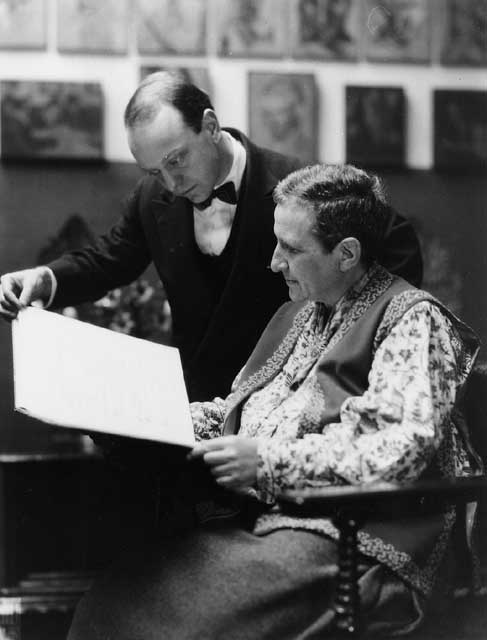 If you think I’m exaggerating, consider the cautionary tale of the first orchestral run-through of Four Saints in Three Acts, at which Virgil Thomson, the composer, was put through the wringer by Alexander Smallens, the conductor. He deserved it, too. Anthony Tommasini tells the story in Virgil Thomson: Composer on the Aisle:
If you think I’m exaggerating, consider the cautionary tale of the first orchestral run-through of Four Saints in Three Acts, at which Virgil Thomson, the composer, was put through the wringer by Alexander Smallens, the conductor. He deserved it, too. Anthony Tommasini tells the story in Virgil Thomson: Composer on the Aisle:
Because there was no budget to hire copyists, Thomson had had to prepare the orchestra score with Maurice Grosser’s help. The previous summer on a Mediterranean island, Porquerolles, he copied out all the individual parts himself, marking the manuscript paper in pencil, averaging ten pages a day. Grosser kept pace, copying over Thomson’s script in ink. There was no piano available to check for accuracy. But Thomson felt he didn’t need one…
The parts contained countless mistakes, as was clear to everyone when the instrumentalists struggled to read through the music for the first time. The hot-tempered Smallens was furious. Thomson, who had been such a bossy perfectionist, was devastated with embarrassment as he made correction after correction, wasting precious time and money.
The extra rehearsal time necessary to make the corrections ended up costing the producers of Four Saints $500, $7,700 in today’s dollars–big money for a small-scale production.
Time and technology, of course, have changed greatly since 1934. Paul Moravec wrote The Letter on an Apple computer, using a program called Sibelius that made it possible for him to create the orchestral score electronically. Using the same program, Subito Music, Paul’s publisher, will generate the orchestral parts for The Letter directly from his digital files instead of hiring copyists to write them out in longhand. By cutting out these once-essential middlemen, Sibelius eliminates the possibility of inadvertent copying errors–but Paul still has to double- and triple-check his electronic “manuscript” to make sure that the notes he wrote were the ones he meant to write. I in turn must read through each page of the score to make sure that Paul has inputted my libretto correctly, including all of the countless revisions that the two of us have made over the past year.
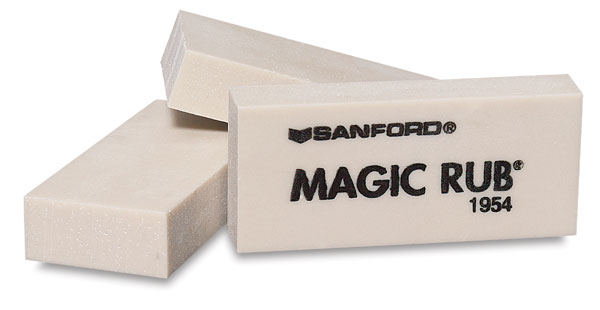 Needless to say, Paul’s job is far more involved than mine. All I have to do is proof the printed text, which is 7,800 words long, a bit more than half the length of a single chapter of Pops: The Life of Louis Armstrong. Paul, on the other hand, has to sift through hundreds of thousands of musical notes in search of niggling errors, any one of which might turn (say) a minor chord into a major one.
Needless to say, Paul’s job is far more involved than mine. All I have to do is proof the printed text, which is 7,800 words long, a bit more than half the length of a single chapter of Pops: The Life of Louis Armstrong. Paul, on the other hand, has to sift through hundreds of thousands of musical notes in search of niggling errors, any one of which might turn (say) a minor chord into a major one.
I loathe such numbing drudgery, which is why I started doing it as soon as Subito e-mailed me my formatted electronic copy of the proofs of the orchestral score of The Letter. As usual, Shakespeare was right: If it were done when ’tis done, then ’twere well/It were done quickly. So I spent a good-sized chunk of a sunny day in San Diego staring at the screen of my laptop and pecking out messages that read like this: “At measure 370, Hammond’s vocal part should include the stage direction Offstage as before. This direction should not be at measure 378.”
Such labor is far from glamorous, but it’s a not-unimportant part of what you’ll be paying for should you decide to pony up $26 for a cheap seat (or $178 for an expensive one) at the first performance of The Letter.
TT: Almanac
“Men rush to California and Australia as if the true gold were to be found in that direction; but that is to go to the very opposite extreme to where it lies. They go prospecting farther and farther away from the true lead, and are most unfortunate when they think themselves most successful. Is not our native soil auriferous? Does not a stream from the golden mountains flow through our native valley? and has not this for more than geologic ages been bringing down the shining particles and forming the nuggets for us? Yet, strange to tell, if a digger steal away, prospecting for this true gold, into the unexplored solitudes around us, there is no danger that any will dog his steps, and endeavor to supplant him. He may claim and undermine the whole valley even, both the cultivated and the uncultivated portions, his whole life long in peace, for no one will ever dispute his claim.”
Henry David Thoreau, “Life Without Principle”
BOOK
Brad Gooch, Flannery: A Life (Little, Brown, $30, out Feb. 25). The first full-length biography of Flannery O’Connor is now available for pre-ordering. Flannery is lucidly written, sympathetic yet detached, thorough but not overly detailed. Among Gooch’s more startling revelations: “Good Country People” is autobiographical, more or less. Don’t expect too, many shockers, but don’t worry about it, either. Surprising or not, this is the book O’Connor’s admirers have been waiting for, and it does her justice (TT).
